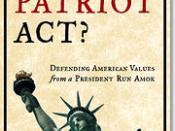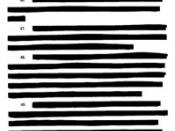"It was even conceivable that they watched everybody all the time. But at any rate they could plug in your wire whenever they wanted to. You had to live--did live, from habit that became instinct--in the assumption that every sound you made was overheard, and except in darkness, every movement scrutinized"
George Orwell's Nineteen Eighty-Four illustrated the nightmare of a world where no citizen was free to speak out against the government, a world in which citizens had no rights. The ever seeing eye of Big Brother caught every movement, every whisper; no one was safe from imprisonment or death. Citizens were brainwashed to keep them gullible. History was re-written. Big Brother's message was written for all to see: War is Peace, Freedom is Slavery, Ignorance is Strength (Orwell 4-5).
America might be closer to Orwell's nightmare than anyone would like to admit. On October 26, 2001, just 45 days after the September 11 terrorist attacks, Congress passed H.R.
3162, the United and Strengthening America by Providing Appropriate Tools Required to Intercept and Obstruct Terrorism Act of 2001, commonly referred to as the Patriot Act. This law was passed to "deter and punish terrorist acts in the United States and around the world, to enhance law enforcement investigatory tools, and for other purposes."(United States 115 STAT. 272)
Some of the provisions in the Act have come under intense scrutiny and criticism by many civil liberties organizations, including the American Civil Liberties Union (ACLU) and the American Library Association (ALA). The majority of the objections stem from the enhanced surveillance powers it gives the executive branch of our government, more specifically sections 213, which allow officials to inspect private property without providing notice, section 214, which allows the government to implement what are known as "trap and trace searches", section 215,


